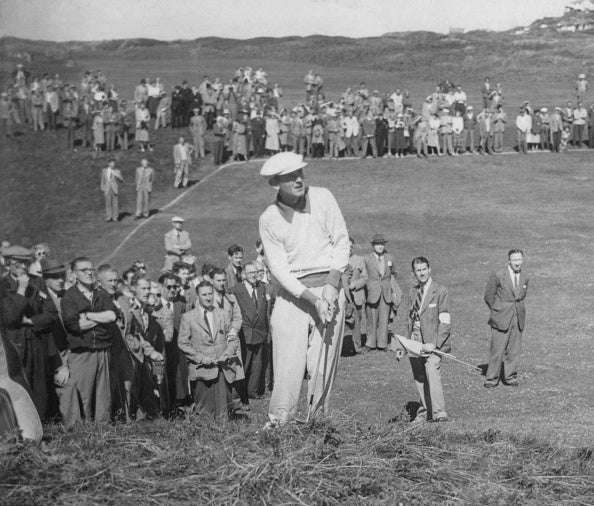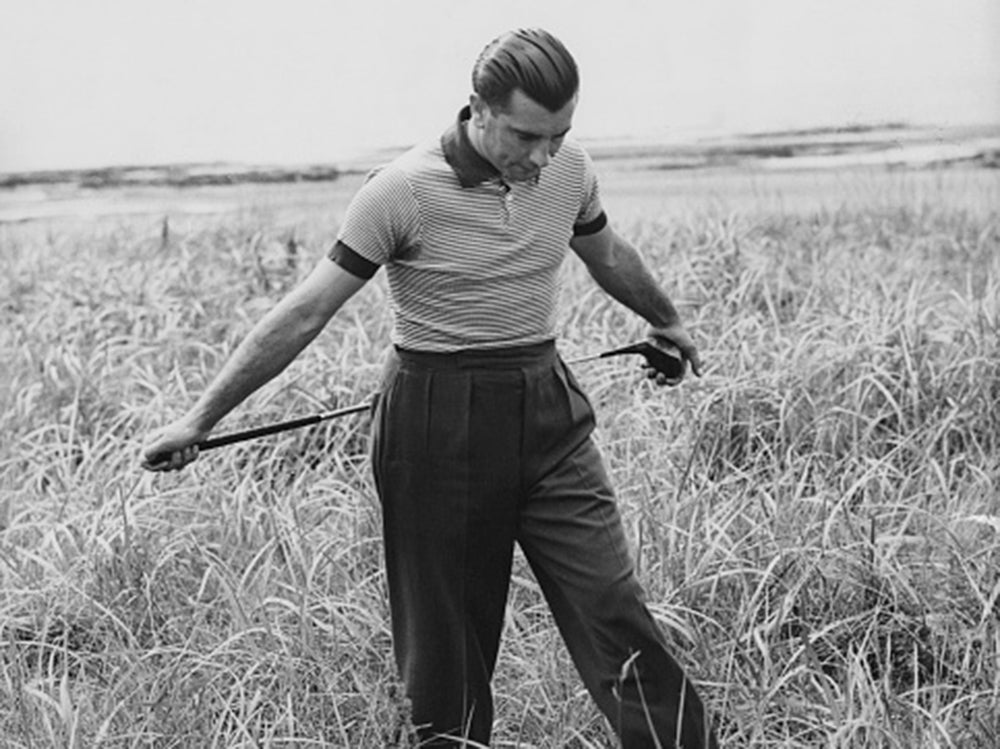The Open 2019: The remarkable tale of Max Faulkner – Royal Portrush’s 1951 champion golfer
England’s par-wrecking machine who milked cows to strengthen his hands surged to rain-soaked glory in North Antrim

Your support helps us to tell the story
From reproductive rights to climate change to Big Tech, The Independent is on the ground when the story is developing. Whether it's investigating the financials of Elon Musk's pro-Trump PAC or producing our latest documentary, 'The A Word', which shines a light on the American women fighting for reproductive rights, we know how important it is to parse out the facts from the messaging.
At such a critical moment in US history, we need reporters on the ground. Your donation allows us to keep sending journalists to speak to both sides of the story.
The Independent is trusted by Americans across the entire political spectrum. And unlike many other quality news outlets, we choose not to lock Americans out of our reporting and analysis with paywalls. We believe quality journalism should be available to everyone, paid for by those who can afford it.
Your support makes all the difference.Methodical Max Faulkner, a par-wrecking Englishman who spent one winter milking cows to strengthen his golfing hands, won the British Open Championship today in a dramatic rain-soaked finish.
Playing sub-par for every round except the last, Faulkner captured the 72-hole event with a score of 285 — highest since 1937 — and two strokes better than his closest pursuer.
But there were some breathless moments after Max finished, for handsome little Antonio Cerda of the Argentine was scorching the Royal Portrush course and it appeared for a time as if the South American would get home with a tie and force a playoff tomorrow.
For 15 holes, Cerda was right on the beam — until he slashed a drive up against some steps straddling a barbed wire fence along the 16th fairway. That did it, for it took Antonio four strokes to reach the green and his chances slithered away with a gloomy 6 in the drizzling rain. Cerda finished with a 287 for second place. Faulkner, who blasted a 2-under-par 70 in the morning round, had a 74 in the afternoon. Cerda shot a 71, then a 70.
Frank Stranahan of Toledo, Ohio, one of two Americans left in the tournament, wound up as the leading amateur in the Open for the third straight time, with a total of 295. His final-round 73 gave him a tie for 12th place with two professionals, Dick Burton of England and Dai Rees of Wales.
Another Ohioan, Sgt. Charles (Chuck) Rotar, onetime Canton pro now with the United States Army in Germany, got a 75 and a total of 303.
Charley Ward, a little British Ryder Cup player, clung to the leaders' flanks with a scorching 68 on his last round, and got third with a total of 290.
Fred Daly, a curly-haired Irishman who won the Open in 1947, and big Jimmy Adams of Scotland, who led on the first day, tied for fourth with 292s.

The great Bobby Locke, seeking his third straight British Open crown, lost his famous putting skill and wound up with a 293 in a tie for sixth with four others.
In his morning round, Bobby missed nine putts of six feet or less, and repeated almost that many in the afternoon as he slow-poked his way around in three and one half hours per trip — backing up the field behind him. Locke had a pair of 74s today, to match his score of yesterday. Only on the first day was he able to break par, with a 71.

Faulkner, a British Ryder Cup star, had stayed out of the wet traps throughout the championship until this afternoon. But he dropped into three of them on the home nine, and gave Cerda the chink he was hunting in Max's armor.
With Max in, Cerda needed a 68 to force the playoff and he was well on his way to getting it. With only three holes to go, he needed to finish in 4s. That's when the steps interfered and he got a 6 on the par-4 16th hole.
AP
Join our commenting forum
Join thought-provoking conversations, follow other Independent readers and see their replies
Comments